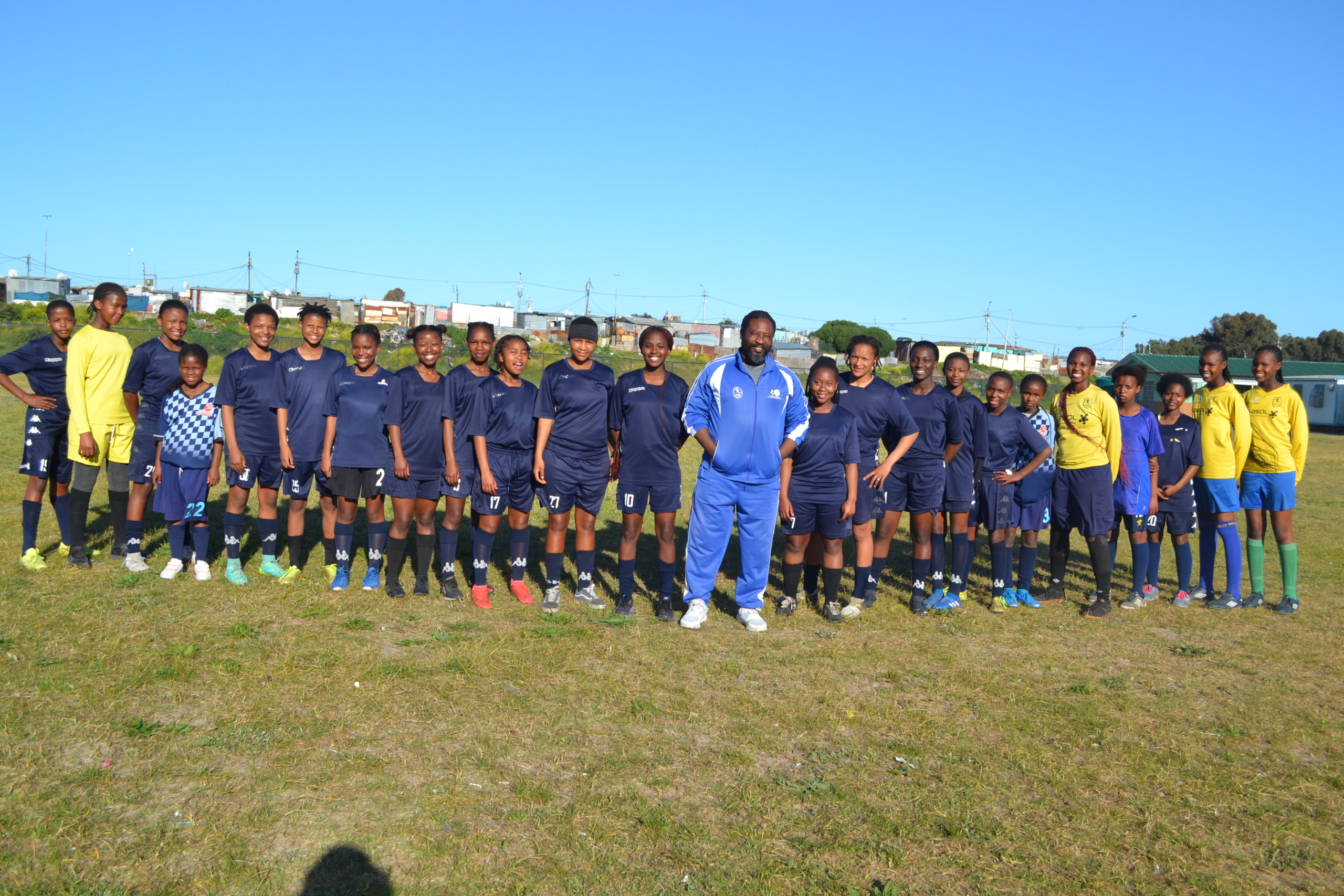The story of South African women’s football would not be complete without a mention of Cape Town Roses Football Club – a powerhouse and a renowned factory of the game.
Ask founder and coach Xolile Madikane how many trophies his Roses team won over the years and he just throws his arms up and says “I don’t know.”
Ask him how many players Roses have produced who have gone to play for various national teams and other top teams around the country, on the continent and abroad, and his response is the same, “I don’t know.”
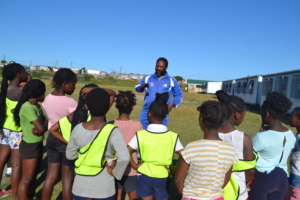
That’s not because he hasn’t been paying attention – it’s just that the sheer scale of the team’s achievements over the past two decades defies calculation.
The team’s countless trophies, including some for the Sasol League and Coke Cup – some of the most difficult tournaments to win – have filled offices at Lwazi Primary School, where Madikane is a deputy principal, and spilled out into Madikane’s home, and even his parents’ house.
This year alone, the Gugulethu-based Roses have won four cups – the Stan Mathews Cup, the Bayview Cup, the Golden United Tournament and the Cape Town leg of the Engen Knockout Challenge. They also narrowly missed out on the Engen Champs of Champs in Johannesburg this week (5 October 2022), losing 5-4 on penalty shootouts in the final to the University of Johannesburg after the two sides were locked on 2-2 at full time.
At the event, Roses goalkeeper Luniko Dywili and forward Jade Jones were named as the Goalkeeper of the Tournament and the Striker of the Tournament, respectively. The brilliance of midfielder Lulamela Vena and forfward Siyamthanda Macingwana was rewarded with call-ups to join the national Under 17 team training camp in Jozi.
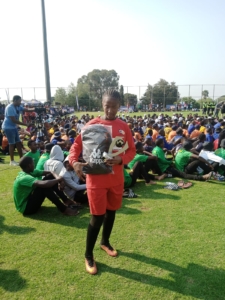
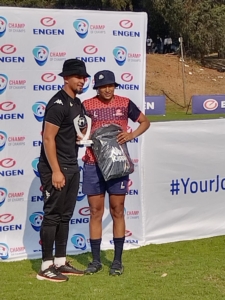
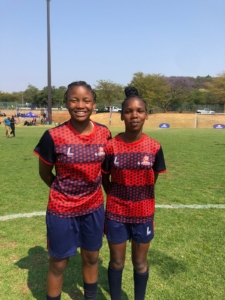
And Roses have yet another chance to add to their trophy cabinet this weekend when they contest the Under 16 division of the Denis Goldberg Champions Cup in Hout Bay.
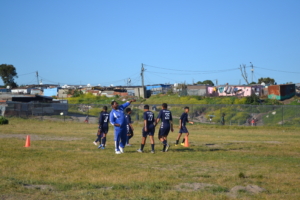
So what has made Roses such a formidable team in Cape Town (and beyond)?
Madikane believes two things have been key to the team’s success: good teaching skills; and a no-nonsense approach to football.
“I’m not here just a coach; I’m a teacher to these learners. I tell parents that sport and education go hand-in-hand. You can’t say your child will not go to a team practice unless she is not going to school. That has helped us to be successful, because people take sport to the same level as education.”
A strong disciplinarian, Madikane doesn’t take kindly to excuses.
“You will never be good until you give your all in training. My players know the philosophy of the team. It’s all about discipline. We have one set of rules for all: I won’t hesitate to send home a top striker with one game remaining in a competition. I would rather lose the entire team than have players who are ill-disciplined.”
But where did it all start?
Xolani Madikane was born in Langa, but he grew up in the Eastern Cape towns of Gcuwa, Centane and Ngqamakhwe. He returned to the Mother City to pursue his studies in education, initially at the former Cape Town College and then at the University of Cape Town, and then joined Lwazi Primary School in 1996.
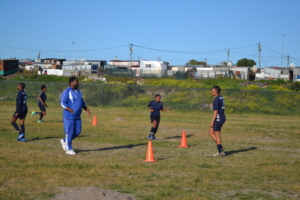
He was coaching a boy’s football team at the school, and a few girls joined in. Soon their number began to grow (and grow and grow), prompting him to start an after-school girls’ team in 1998 so that it would be open to learners from the neighbouring schools. The following year they won the provincial league – and the rest, as they say, is history.
And what a history!
The team has constantly produced world-class footballers, including the Cesane twins, Noxolo and Sinoxolo, who are plying their trades in France and the United States, respectively; Namibian star Dina Shithula; and Banyana stars Leandra Smeda, Roxanne Barker and Ode Fulutudilu; the list is endless.
In fact, when the first National Women’s League (now called the HollywoodBets Super League) was established in 2019, Roses had to release no less than 17 players as clubs around the country helped themselves to his products. “I tried to take up the matter with Safa but to no avail. At some point I wanted to just give up and sell Roses.”
That season Roses became a shadow of its former self, and took a beating in the league. “It was tough but we’ve tried to establish our stamp again and produce good players in all divisions.”
Madikane’s biggest wish is for more support to women’s football from parents, the community and especially the corporate sector.
The team has never been sponsored, except for Lotto a few years ago. Balls, kits and cones are paid for out of his pocket and the money the team wins from tournaments.
It’s not enough to do the players justice.
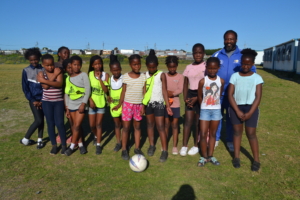
“You see what these kids are wearing,” he says, pointing to children training with flops, school shoes and worn-out takkies. “When a child goes for the ball, you are never sure if this is what she can do, because she is trying to keep balance while trying to control the ball at the same time. If she slips, she gets frustrated.”
Still, there are light-hearted moments, too. Like when a young girl who was to be a keeper for the first time cried when she was teased by others that she would remain in the box (18 area) while others play. Or a young striker who when the coaching staff called on her to hold the ball (before taking a shot) but she literally held the ball with her hands.
Someone of Madikane’s calibre could be expected to be contributing his expertise to a national football structure. “Not in this country. We will never win a major international tournament because we are never represented by the best material we have in the country. But I’m okay and I’m doing my work, and busy doing something for the community.”
What makes Madikane jump out of bed to coach girls after all these years?
“When something like this happens,” he says, pointing to an Under 14 goalkeeper teaching a new girl who is coming to training for the first time.
“She was born ten years after I started the team, and now she’s a first team goalkeeper teaching the young ones, as she was also taught by others. When I don’t have to be all over in training, then I know I have produced teachers. And we can always use more teachers.”
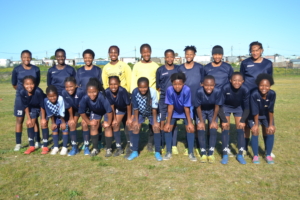
Edited by Nicklaus Kruger

